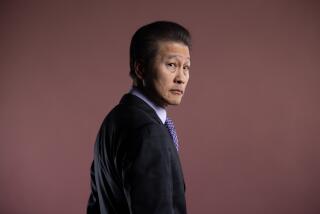‘Equals’ Merger Places Banker on Cutting Edge
- Share via
SAN DIEGO — Robert Richley doesn’t look as if he’s on the cutting edge of anything.
He looks like a typical banker--dark three-piece suit, polished shoes, trimmed nails.
But Robert Richley talks as if he’s on the cutting edge of the banking industry.
And he certainly believes he is.
Now, Richley will have a chance to prove it.
Sometime in February or March, shareholders of First National Corp., parent of First National Bank and the company that employs Richley as president and chief executive, will vote whether to merge with National Bankshares of La Jolla and National Bank of Fairbanks Ranch.
The merger, which originally included Rancho Santa Fe National Bank until it backed out at the last minute, is considered the first “merger of equals” in the West.
It’s also viewed by analysts as the beginning of a trend that will see many small, financially healthy banks merging so they can better compete in interstate banking, which begins in the West next summer.
It’s a cutting-edge deal because of its uniqueness and because, according to Richley and others involved in the merger, the management approach will be similar to a large law office, where a partner-in-charge runs the administrative and overall policy operations while the partners are free to expand and work on their own.
If shareholders of the banks approve the merger, First National Corp., the surviving entity, will become the county’s third largest bank, with assets of roughly $350 million and capital of about $26 million.
In the process, Richley will lose his job as bank president--National Bankshares President Michael West will assume that spot--but he’ll now captain a bank holding company that, Richley believes, will “play a dominant role in the banking business in Southern California.”
Tough talk from a man who, in 1986, headed a bank that will barely report a profit for the year ended Dec. 31 and that boasted assets of only $168.8 million.
Yet, despite the merging of two high-powered, prominent boards of directors and two organizations aimed at upscale clientele, local banking experts believe the new First National will be a force to reckon with.
“As it’s structured right now, there seems to be a strong agreement that this is in everybody’s best interest,” one banker judged. “In the long run, it will work. But there’ll be the honeymoon period, where everybody sees the benefit, then an intermediate state, where everybody sees the reality, and then finally a successful operation.”
The merger benefits both sides because First National’s strength is in its capital base, equity of $16.6 million was nearly 10% of its assets, and the strength of National Bankshares--holding company for National Bank of La Jolla and National Bank of Fairbanks Ranch--is its relatively strong earnings.
The flip side was that First National’s earnings had dropped--in large part because of its $1-million share of a $6.9-million out-of-court settlement with former J. David & Co. investors who sued the bank for allegedly aiding and abetting J. David (Jerry) Dominelli.
Too, National Bankshares’ capital base needed bolstering. Its equity to assets as of Sept. 30 was 5.8%, compared to First National’s 9.8%.
In October, National Bankshares completed a $2-million private placement from directors and others to boost its capital.
“Board members had to wonder, ‘How much more will I have to invest?’ ” according to one banker.
Meanwhile, Richley acknowledges that he doesn’t yet know exactly how he’ll grow his banking holding company into a “dominant force.”
“But we’ve spent a lot of time understanding what type of franchise will be important for our customers and investors,” he said in a recent interview. “Where we can attract the right kind of partner on the right basis, we’ll do it.”
The bank will remain below $500 million in assets at least through the end of 1987. “Costs go up when you exceed $500 million,” he said, referring to the annual fee charged by the Federal Reserve System and to related organizational costs. “So it’s better to (have) $750 million in assets than $515 million,” from an economies-of-scale viewpoint.
It’s been 13 months since Richley was hired to head First National--he was executive vice president of Crocker Bank in Los Angeles--and he candidly acknowledges that he envisioned a merger like the one just fashioned when he first joined the bank.
“This is just the beginning,” he smiled. “As a banker, this is as entrepreneurial as you can get.”
The stock market seems to agree. When the deal was announced in late November, First National’s stock was trading at 9. It closed Monday at 10 3/4.
More to Read
Inside the business of entertainment
The Wide Shot brings you news, analysis and insights on everything from streaming wars to production — and what it all means for the future.
You may occasionally receive promotional content from the Los Angeles Times.










